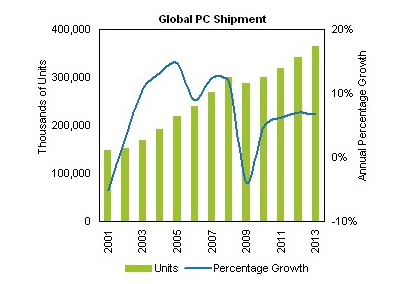PC sales to see biggest drop since 2001 tech bust; IT spending responsible

The number of PCs shipped around the globe in 2009 is expected to be lower than the previous year, the first time since the 2001 dot-com bust, according to market research firm iSuppli.
Just 287.3 million PCs will be shipped in 2009, a 4 percent decrease from the 299.2 million shipped around the world in 2008, according to a projection in a report released Tuesday by iSuppli.
To be sure, expectations were conservative for this year -- but iSuppli's projection indicates that the industry is on track to do worse than previously thought, with 0.7 percent growth for the year.
(For the last eight years, PC manufacturers have been able to ship more units each year. Such a small figure is highly unusual.)
iSuppli says the culprit is "the fading out of the desktop computer," but I'm not so sure. According to the study, shipments of desktops are expected to decline 18.1 percent this year, while notebooks are on track to grow almost 12 percent this year -- the first time they outpaced desktop shipments for a whole year.
Here's iSuppli's full explanation:
The primary factor driving the decline in the PC market in 2009 is an expected 18.1 percent plunge in desktop shipments. Unit shipments of desktop PCs will amount to 124.4 million in 2009, down from 151.9 million in 2008. Entry-level servers—which iSuppli includes in its definition of PCs—also will suffer a decline, with shipments falling to 6.9 million units, down 9.5 percent from 7.7 million in 2008.
My question: If desktops are merely fading out, why aren't laptops replacing them at a fairly equal rate? Seems to me that average selling prices have certainly been on the decline in the past few years for both types of systems.
(That doesn't mean PC makers aren't bucking the trend: despite it, PC makers continue to push all-in-one desktop computers. But they haven't quite caught on.)
iSuppli offers another point that I think better reflects the drop: a tightening of the belt thanks to a severe dropoff in IT spending by corporate customers. (Think desktops and servers.)
The good news? Dell recently announced that it believes that IT demand is stabilizing.
